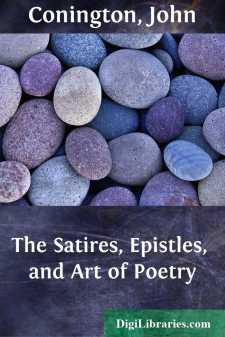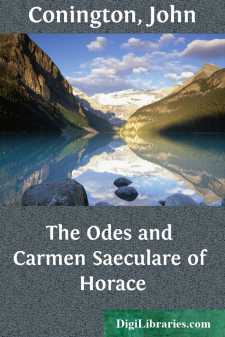Categories
- Antiques & Collectibles 13
- Architecture 36
- Art 48
- Bibles 22
- Biography & Autobiography 813
- Body, Mind & Spirit 142
- Business & Economics 28
- Children's Books 17
- Children's Fiction 14
- Computers 4
- Cooking 94
- Crafts & Hobbies 4
- Drama 346
- Education 46
- Family & Relationships 57
- Fiction 11829
- Games 19
- Gardening 17
- Health & Fitness 34
- History 1377
- House & Home 1
- Humor 147
- Juvenile Fiction 1873
- Juvenile Nonfiction 202
- Language Arts & Disciplines 88
- Law 16
- Literary Collections 686
- Literary Criticism 179
- Mathematics 13
- Medical 41
- Music 40
- Nature 179
- Non-Classifiable 1768
- Performing Arts 7
- Periodicals 1453
- Philosophy 64
- Photography 2
- Poetry 896
- Political Science 203
- Psychology 42
- Reference 154
- Religion 513
- Science 126
- Self-Help 84
- Social Science 81
- Sports & Recreation 34
- Study Aids 3
- Technology & Engineering 59
- Transportation 23
- Travel 463
- True Crime 29
The Satires, Epistles, and Art of Poetry
by: John Conington
Description:
Excerpt
In venturing to follow up my translation of the Odes of Horace by a version of the Satires and Epistles, I feel that I am in no way entitled to refer to the former as a justification of my boldness in undertaking the latter. Both classes of works are doubtless explicable as products of the same original genius: but they differ so widely in many of their characteristics, that success in rendering the one, though greater than any which I can hope to have attained, would afford no presumption that the translator would be found to have the least aptitude for the other. As a matter of fact, while the Odes still continue to invite translation after translation, the Satires and Epistles, popular as they were among translators and imitators a hundred years ago, have scarcely been attempted at all since that great revolution in literary taste which was effected during the last ten years of the last century and the first ten years of the present. Byron's Hints from Horace, Mr. Howes' forgotten but highly meritorious version of the Satires and Epistles, to which I hope to return before long, and a few experiments by Mr. Theodore Martin, published in the notes to his translation of the Odes and elsewhere, constitute perhaps the whole recent stock of which a new translator may be expected to take account. In one sense this is encouraging: in another dispiriting. The field is not pre-occupied: but the reason is, that general opinion has pronounced its cultivation unprofitable and hopeless.
No doubt, apart from fluctuations in the taste of the reading public, there are special reasons why a version of this portion of Horace's works should be a difficult, perhaps an impracticable undertaking. It would not be easy to maintain that a Roman satirist was incapable of adequate representation in English in the face of such an instance to the contrary as Gifford's Juvenal, probably, take it all in all, the very best version of a classic in the language. But though Juvenal has many passages which sufficiently remind us of Horace, some of them light and playful, others level and almost flat, these do not form the staple of his Satires: there are passages of dignified declamation and passionate invective which suffer less in translation, and which may be so rendered as to leave a lasting impression of pleasure upon the mind of the reader. Like Horace, he has an abundance of local and temporary allusions, in dealing with which the most successful translator is the one who fails least: unlike Horace, when he quits the local and the temporary, he generally quits also the language of persiflage, and abandons himself unrestrainedly to feeling. Persiflage, I suppose, even in ordinary life, is much less easy to practise with perfect success than a graver and less artificial mode of speaking, though, perhaps for that very reason, it is apt to be more sought after: the persiflage of a writer of another nation and of a past age is of necessity peculiarly difficult to realize and reproduce. Nothing is so variable as the standard of taste in a matter like this: even on the minor question, what expressions may and what may not be tolerated in good society, probably no two persons think exactly alike: and when we come to inquire not simply what is admissible but what is excellent, and still more, what is characteristic of a particular type of mind, we must expect to meet with still less unanimity of judgment. The wits of the Restoration answered the question very differently from the way in which it would be answered now; even Pope and his contemporaries would not be accepted as quite infallible arbiters of social and colloquial refinement in an age like the present. Whether Horace is grave or gay in his familiar writings, his charm depends almost wholly on his manner: a modern who attempts to reproduce him runs an imminent risk first of losing all charm whatever, secondly of missing completely that individuality of attractiveness which makes the charm of Horace unlike the charm of any one else.
Without however enlarging further on the peculiar difficulty of the task, I will proceed to say a few words on some of the special questions which a translator of the Satires and Epistles has to encounter, and the way in which, as it appears to me, he may best deal with them. These questions, I need hardly say, mainly resolve themselves into the metre and the style. With regard to the metre, I have myself but little doubt that the measure in which Horace may best be represented is the heroic as I suppose we must call it, of ten syllables....



